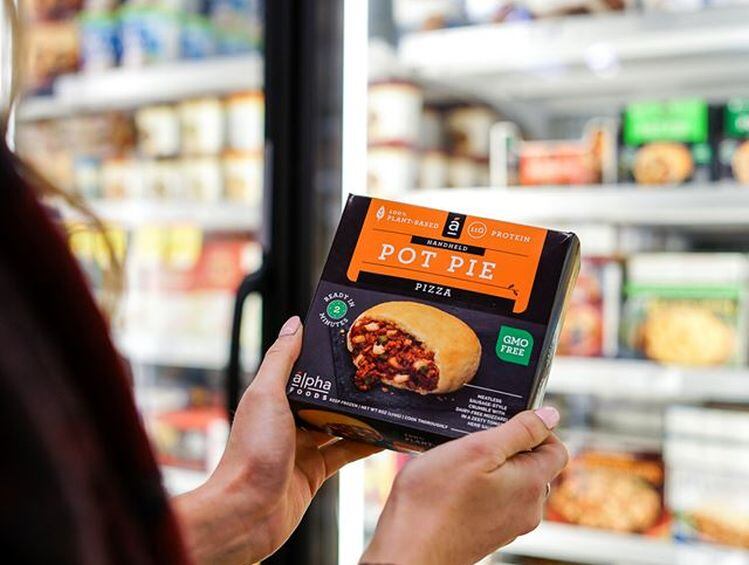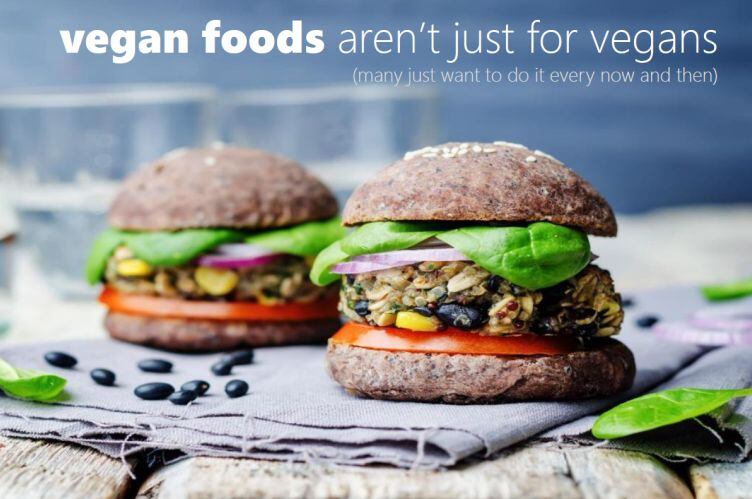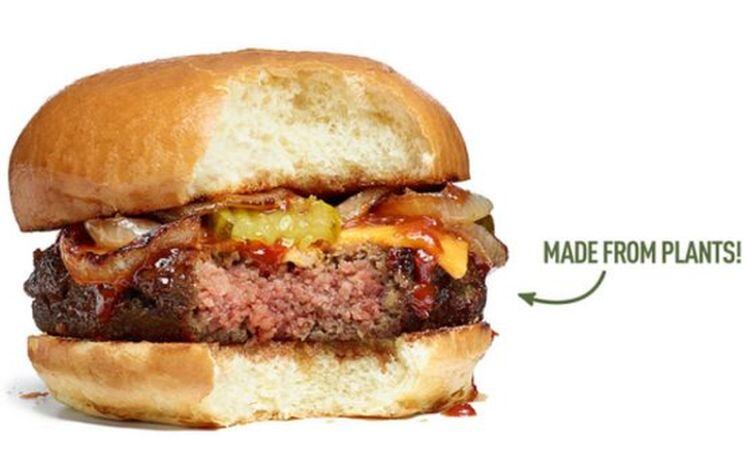“It’s no secret that the growth is coming on the fresh side [and Alpha Foods is planning a move into the refrigerated segment] but that doesn’t mean that there isn’t still a massive opportunity in frozen,” co-founder Cole Orobetz told FoodNavigator-USA.
“We know that we’re growing the frozen category for a number of retailers. At Walmart, we believe they are expanding the frozen plant based set from maybe one or two doors to three to four doors. From some of the market data we’ve seen, the highest preference in the plant-based category is for prepared meals, so we have pizza, tamales, pot pies and burritos."
He added: “We have three buckets of consumers. One is the millennial that wants a quick easy meal they can grab and go that’s also plant based; the other is the head of household purchaser, so moms feeding their families; and the third is the more traditional vegan consumer looking for new flavors, formats and eating experiences.”
All of which adds up to a sizeable consumer base, he said: “The size of the animal protein market is gigantic, and in terms of percentages, we see plant-based meat surpassing plant-based milk [which has captured 13% of the fluid milk market], so the market opportunity is massive.”
‘We’re about to begin our next wave of expansion with Walmart’
While most plant-based brands debut in the natural channel, Alpha Foods’ first three customers were Walmart, Publix and Kroger, a reflection of how mainstream the category is now becoming, added Orobetz, who founded a recycled plastic lumber fabrication and sales company aged just 18, and crossed paths with his co-founder Loren Wallis (cofounder of Good Karma Foods) while serving as investment director at Avrio Capital in 2015.
“Walmart was our first customer, so we were anxious about how we would perform, but the data shows we’ve had a successful product from day one, so that’s why we keep getting more stores. We’re about to begin our next wave of expansion with Walmart with pot pies, the launch of our new personal vegan pizzas, and [additional SKUs of] burritos.
“We’re also going to be in pretty much full distribution across Safeway Albertsons starting in the fall, and that will take us up to somewhere in the neighborhood of 7,000 doors in the next 60 days; our estimate towards the end of the year will be upwards of around 8,000 doors as we’re talking to some other major retail accounts coming on around November/December.
“We’ve also expanded our footprint in the natural channel with an additional line at Sprouts and we finally launched at Whole Foods after two years of grinding away and getting our Non GMO Project verification.”

Merchandising plant-based meat products
In general, he said, stores stocking three or more Alpha Foods products “turn faster and better than stores with two [facings], so building our brand block out is very important. When we meet buyers we share this data and push for more SKUs [merchandised] together.
“What we’re also seeing is that retailers with dedicated plant-based sets are turning higher, which could be a challenge with the general vision of the sector, which is that plant-based products should be spread across all categories in the store.”
Where is the white space in the plant-based meat products category?
Right now, the Philly and the chicken fajita burritos are the top sellers, he said, “but in recent months we’ve had so much interest in our nuggets. Publix launched them in February, and we’re seeing a ton of inbound interest. They’ve also just started selling out of Hong Kong.”
Asked about white space in the category, he said: “There hasn’t been a lot done with pork yet, and fish – although there’s been some recent innovation there - and chicken is also an area where we’ve been putting a lot of resources lately, which also makes sense as Americans are eating less beef and more chicken. We’re just following that trend in a parallel path on the plant-based side.”
‘We had a vision to be a globally relevant protein player on the plant based side’
When it comes to manufacturing plant-based meat, he said, “What’s lacking is the infrastructure. Only in the last couple of years have we seen groups that have understood that companies need to invest big dollars into the production of plant based meat in Europe, North America, and Asia to reach critical mass and bring the unit economics down. Someone has to pay the bill for the infrastructure required as these products are much more complex to make than almond milk or soy milk.
“We are co-packed and it was [initially] challenging to get people to take the opportunity seriously. Now all of a sudden, the tables have turned because of the buzz and the headlines, and co-packers are saying, 'Oh god we’ve got to get into plant based. Who are those Alpha guys that knocked on our doors three years ago that we slammed the door on?' So the dynamics have shifted.”
He added: “What’s relevant here is scale. When we started, we decided to build a scalable company with a big vision to be a globally relevant protein player on the plant based side and we had to find manufacturing partners that could scale with us. That meant that we had these gigantic minimum run sizes. Sometimes there was some flexibility, but sometimes not; it was a case of it is what it is, take it or leave it.
“However, Loren and myself had a number of years of experience working with co-manufacturers and a lot of pre-existing relationships, so that really helped us forge ahead.”

‘Just because a steak has one ingredient, doesn’t mean that it’s healthy’
Asked whether plant-based meat products were getting a reputation as ‘highly processed,’ he said: “I think in general, people feel better about what they are putting into their bodies [when they select plant-based] for a variety of reasons, but we’ve become very aware of certain ingredients that may be problematic for certain retailers – things like palm oil or carrageenan or whatever.”
That said, “just because a steak has one ingredient, doesn’t mean that it’s healthy,” he observed. “We also know from the WHO that processed meat is linked to [a higher risk of certain] cancers, and I think the general populace is accepting [of the level of processing in plant-based foods].”
Labeling debate ‘legitimizes the plant-based sector and raises awareness’
Frustrating though state level bills attempting to restrict the use of ‘meaty terminology’ on plant-based foods are for plant-based brands, he said: “I actually think this debate legitimizes the plant-based sector and raises awareness, as people that have no clue what plant-based meat is are now reading about it in the papers and in their news feeds.
“I hope that industry efforts [to fight such state level bills] prevail but also that sanity prevails, because it’s just absurd, no one is confused about these products.”
Glendale-CA-based Alpha Foods' meat analogs are made from non GMO soy, and vital wheat gluten, which are pretty standard source materials in the space, but also utilize proprietary recipes and processing techniques, claims CEO Loren Wallis.
"Soy and wheat do a phenomenal job, although we're testing the latest pea proteins, mycoproteins and legume proteins as well. I know pea proteins have worked well for some companies [eg. Beyond Meat], but we've found the ones we've used tend to break down more, and they don't create the structure that we want. They also have a pungent, prominent, flavor profile. The meatless meats in our product are made by co-packers, but they use Alpha-owned IP and we own the formulas."
“Right at the beginning, Cole and I sat down and imagined what the company should be: not a Mom and Pop operation, but something that could go to $100, $200 million, to no limits."
Loren Wallis, CEO, Alpha Foods
“In addition to having a great product and great timing, Alpha Foods has the ability to grow and scale at a much more rapid pace than many other players in this segment.”
Dan Y Altschuler Malek, senior venture partner, New Crop Capital





